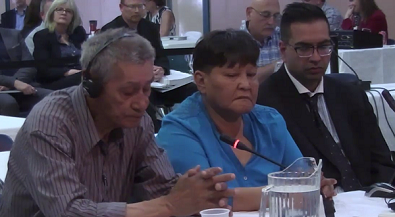Elder Paul Sylvestre speaks at the hearing on Wednesday. Stillshot from http://nuclearsafety.gc.ca/
A two-day nuclear safety hearing is underway in La Ronge, with AREVA Resources seeking to renew its uranium operating licence at its McClean Lake site for the next 12 years.
AREVA’s last licence request was only for eight years, and expires at the end of the month. The operation wants to continue to produce nearly 11 million kilograms, or 24 million pounds, of uranium and to process Cameco’s Cigar Lake uranium ore slurry.
The decision made by commissioners at the Canada Nuclear Safety Commission (CNSC) hearing will only focus on environmental, safety, and human health impacts, and economic impact will make no bearing, CNSC secretary Marc Leblanc said at the outset of the hearing held at the Kikinahk Friendship Centre.
In day one of the hearing, the output levels of a potentially dangerous mineral called selenium were discussed in-depth. CNSC staff explained selenium is an essential nutrient to humans and fish but in high concentrations it can be toxic; and said the line between those two is pretty narrow. The toxic effect varies by animal: for humans there are gastro-intestinal effects that can damage the liver, whereas egg-bearing animals can have reproductive effects on developing embryos.
The mine monitors water downstream from its treated liquid waste release site and has had issues with high selenium levels each time McClean Lake restarts its mill, most recently in 2014, said Dale Huffman, Vice President Health Safety Environment and Regulatory Relations. Levels were also too high in 2016, as noted by both AREVA and CNSC staff who did independent monitoring. Since then, Huffman says those levels are now in check and on track to be down throughout 2017.
The region’s Medical Health Officer James Irvine said they have done pre-natal biomonitoring and found northern Saskatchewan women tested have lower selenium levels than women tested from all over Alberta.
Another major topic at Wednesday’s hearing was the need for meaningful and respectful consultation during engagement sessions. Nine different groups, First Nations, or individuals were provided with a total of $75,000 for engagement in order to receive what CNSC calls “valuable” information before the hearing. However, representatives from Buffalo River Dene Nation and Birch Narrows Dene Nation said their earlier sessions left them feeling disrespected and were at times heated.
On Wednesday, legal counsel from the two nations said leadership believes there is a duty to consult even if the footprint of the project stays the same as permitted in the past.
“The permitting for renewal of activities at the project will lead to additional mining of the subsurface and is akin to the takeup of new land which can trigger a deep duty to consult,” said lawyer Amin Lalji.
At day’s end, all sides agreed they had made headway in improving communication. However, it is unclear whether the Buffalo River and Birch Narrows arguments will require further discussion for the licence renewal application to be approved.
